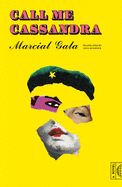
Greek mythology's princess Cassandra was given the power of prophecy, but when she refused the advances of the god Apollo, she was cursed forever with disbelief. Millennia later, a slight, blond 10-year-old in Cienfuegos, Cuba, insists, "I don't want to be this Raúl, I want to be Cassandra." And yet in the first few pages of Cuban novelist Marcial Gala's provocative Call Me Cassandra, Raúl reveals his immutable fate, to become a "little pretend soldier in Angola" and die at just 19.
Truth from others eludes Raúl throughout his short existence, with a philandering father, a belligerent older brother and a mother disconnected from reality. For young Raúl, his life and body are hardly his own--but knowing he is Cassandra reincarnate is absolute. Bullied by father, brother and schoolmates for not embodying the gender assigned at birth, Cassandra escapes to a faraway, long-ago Troy--whether imaginary or real is irrelevant--to be nurtured by memories, advised by mythic voices. As a soldier at 18, she's sent across the world as part of the 1975 Cuban intervention supporting the communist People's Movement for the Liberation of Angola. Her fate--and everyone else's--is already determined: Cassandra's future holds no kindness.
Translated by Cuban American Anna Kushner, Gala's second English-language novel (after The Black Cathedral) is no easy read: the violence here is vivid and gut-churning throughout. Knowing the outcome from the beginning offers little solace. Nevertheless, Gala is an inventive, enticing storyteller, moving fluidly between past and present--and beyond--effortlessly traversing Greek temples and palaces, Cienfuegos's nightclubs and Angolan battlefields to deliver a brilliantly subversive coming-of-age triumph. --Terry Hong, Smithsonian BookDragon

